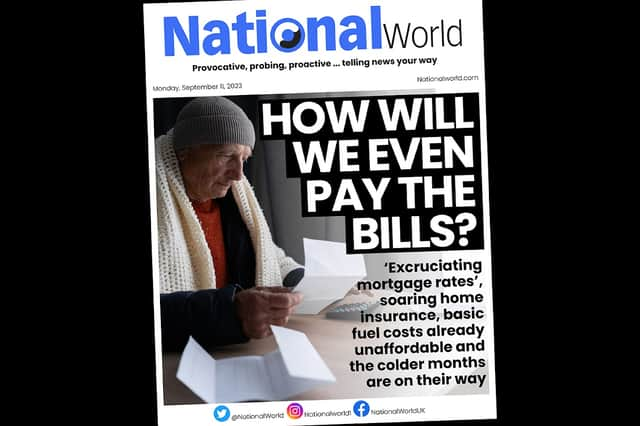As the cost of living crisis rumbles on we’re all left feeling that it’s just not getting any easier
and live on Freeview channel 276
Whether you’re a young person living in the city, like myself, or a homeowner settled in the suburbs, the feeling is still the same - it’s not getting any easier. Colder months are on the horizon, along with rising mortgage rates, growing petrol prices and buckling bank accounts and this time, the government aren’t offering the same support.
My experience of the cost-of-living fallout has been tangible. As with most 18-25 year olds. You live on the edge of a crumbling economy, picking at the scraps. Overwhelming rent prices accompanied by crippling energy statements and finance-stripped councils hiking bills to stay afloat.
There is also a greater proportion of younger workers in part-time, unstable or temporary jobs and people below the age of 35 are the most mobile in the workforce as they try to game more experience. But chasing employment is a steep and slippery slope into overpriced city-life.
Research by the Office for National Statistics (ONS) show those between 25 and 34 were reported to be 3.4 times as likely to experience financial vulnerability as those aged 75 years and over. With most in this bracket, working on a tighter budget and more likely to fall behind on housing costs.
That being said, rising mortgage rates are changing the landscape and in some areas of the UK, it is now more expensive to buy a home for the first time than to rent. According to property website Zoopla, the average UK rent is £1,163 per month, while average mortgage repayments are £1,285 for first-time buyers with a 15% deposit.
For renters and home-owners alike, monthly outgoings aren’t getting easier to manage. Research by Censuswide, claims nearly three-quarters (73%) of people said they do not have their spending fully under control, with nearly half (47%) citing the rising cost of living as the cause.
And despite UK inflation falling to 6.8% in August, the survey found that nearly half (48%) of people’s overall spending had increased in the previous three months - citing essential groceries, toiletries and petrol as a driving force.
So what is the current state of the cost of living crisis and what can home-owners and renters expect this winter?
Petrol and diesel
According to figures released by the Department for Energy Security and Net Zero, the price of petrol on UK forecourts has risen to its highest level so far this year. The average pump price of a litre of unleaded petrol stood at 151.7p as of September 4 and is the seventh consecutive weekly jump.
The rise is being driven by an increase in the cost of oil, which has gone up by nearly 12 US dollars a barrel since the start of July to more than 88 US dollars, due to producing group Opec+ reducing its supply. The average price of diesel has also been rising in recent weeks, climbing from 144.6p a litre in mid-July to 154.7p as of Monday.
Energy bills
Ofgem announced the new level of the energy price cap on August 25, slashing household energy bills to their lowest rate for 18 months. However, the reduction hasn’t compensated for the end of the government’s winter energy bills support and energy bills will still be higher this coming winter than they were last year, according to analysis by the Resolution Foundation.
Additionally, the government’s decision to commission no new offshore wind farms has been heavily criticised by politicians. Labour’s Shadow Energy and Net Zero Secretary, Ed Miliband, said the move was “an energy securing disaster”, and could mean a £1 billion bombshell for families’ energy bills.
Likewise, Greenpeace UK’s policy director, Doug Parr said the decision leaves the UK more dependent on expensive, imported fossil gas moving forward. “Offshore wind is one of the cheapest and cleanest forms of power there is, but in an effort to save consumers pennies on their energy bills, the government is costing them pounds,” he said.


Mortgage rates
UK mortgage rates have rocketed over the last 12 months and unfortunately, the Bank of England is widely expected to hike its base rate once again in September. Despite lender’s easing up on rates in recent months, a good spell of falling inflation may stall due to positive wage growth throughout the summer.
If you’re due to remortgage in the coming weeks and months, you’re likely to find your monthly repayments will rocket. For around one million households who are due to remortgage between now and 2026, monthly costs are expected to rise by at least £500 according to Bank of England estimates.
The worry about rising cost is evident for home-owners across the UK. According to Which?’s Consumer Insight Tracker, 79% of mortgage owners are worried about housing costs, the highest level since the survey began in 2013.
Comment Guidelines
National World encourages reader discussion on our stories. User feedback, insights and back-and-forth exchanges add a rich layer of context to reporting. Please review our Community Guidelines before commenting.
